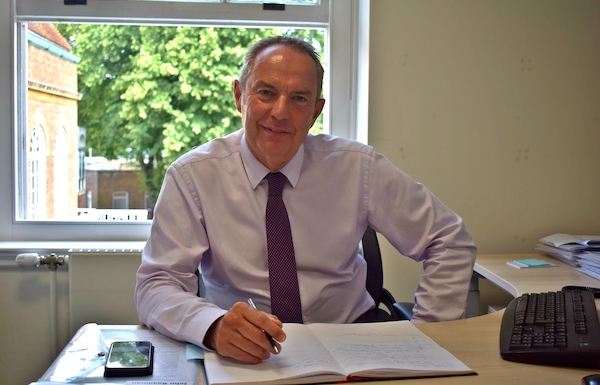It’s April 2019 and John Readman is about to address West Sussex children’s services’ quarterly staff conference in Worthing.
It’s his second day as director of children’s services and today the staff in the room are hearing the findings of Ofsted’s recent inspection for the first time.
And it’s not pretty.
West Sussex is about to get an inadequate rating. Inspectors uncovered numerous problems. Weaknesses in the handling of neglect cases. Gaps in supervision. Ineffective quality assurance. Children not being visited often enough.
As the findings are recounted, John sees the concerned looks on the audience’s faces. Staff who wonder how the service is going to fix these problems. A task that John is now in charge of.
But today John has a clear message: We can do this.
“It’s my firm belief that a system may be assessed as inadequate, but that doesn’t mean the individuals within it are,” he tells them. “Everybody here wants to do right by the children of West Sussex and Ofsted’s findings are concerning. But, together, as a team we can meet this challenge.
“It’ll be hard, but we can do this and we must do this. The children of West Sussex are depending on us to get this right.”
Make a big difference

John Readman, director of children’s services, West Sussex
None of the findings revealed that day were a surprise for John, who previously headed children’s services in Lancashire, Bristol and Hull. In fact, the challenge is what brought him to West Sussex.
“Like any social worker, I want to work in a place where I can make the biggest and best difference, and it was clear West Sussex needed support and help,” he says, three months on from that meeting in Worthing.
“Before joining I met some of the team and I was really energised by the people I met at the top and in practice. So I was excited to come and play my part in improving this service.”
Another positive was that the council had already realised the service was in trouble before Ofsted arrived and started investing in improvement.
“They put more investment into the service and social worker recruitment in November,” says John. “It was too early for that to have made an impact by the time of the inspection, but that was the beginnings of the council’s political and corporate leaders really getting behind children’s services.”
Children first
An extra 37 full-time social worker jobs were created and as new staff continue to join, the challenge to recruit experienced, permanent social workers continues.
The change has seen West Sussex put an extra £10 million a year into children’s services and adopt a council-wide principle of Children First.
Some of the extra funding will be used to bolster administrative support for social workers so they can spend more time doing direct work with children and families.
The money’s also allowing the service to recruit more social workers and offer existing as well as new, experienced practitioners a 20% of salary payment as part of a new retention scheme.
“85% of our social workers have signed up for the retention package,” says John.
“In doing so they’re making an 18-month commitment to the service and that’s impressive after a negative inspection. The team here is saying: ‘No, I want to play my part in improving the service for vulnerable children.'”
Social workers want to come here
The council’s ongoing recruitment drive is paying off too.
Since recent months, fifty more people have joined the county’s team of 450 children’s social workers, causing the vacancy rate to drop from 18% to 7%.
“People want to come here,” says John. “They know there’s a significant task ahead, but this is a place where they can make a real difference to children and families.
“It’s also an organisation that demonstrates how much it values social workers through a favourable salary and retention package as well as the significant investment we’re making in training, development, and support.”
The influx of new social workers is starting to ease the caseloads burden in West Sussex.
“Caseloads are at the lowest they’ve been for two years for most of our social workers,” John notes. “Manageable caseloads are critical to successful improvement. You can be the best social worker in the world with the best standards, but if you’re handling too many cases it impacts your practice.”
Specialist social workers
The recruitment and retention drive is one of the three-prongs of the first phase of the improvement journey.
Another is the quick action being taken to make the service safer, which has included giving social workers new training and toolkits for dealing with neglect, and revising schedules so frontline practitioners get good-quality, reflective supervision.
The final prong is the development of a two- to three-year practice improvement plan that sets out how the service will raise standards.
Actions in the plan include a new auditing process that supports learning by involving the practitioners, training managers in performance coaching, and appointing social workers who will specialise in pre-birth or court work. These and more are all planned in year one.
John is keen to stress that it will take a team effort to drive the necessary change.
Allowing practitioners to flourish

Gillian Buchanan, principal social worker, West Sussex
Gillian Buchanan is the principal social worker for West Sussex.
“Whilst we recognise and accept the Ofsted findings, it’s important that we don’t lose sight of some of the excellent practice and dedication that already happens in West Sussex,” she says. “As principal social worker, I’ve spent time with social workers across the whole service and I’ve seen first-hand how they go above and beyond to keep children safe.
“On the back of a bad inspection there will always be increased scrutiny on our compliance, our regulations and our statutory duties and that’s understandable,” Gillian adds.
“However we need to remember that, ultimately, social work is about making that positive difference for children. We need more experienced social workers to join us who hold onto their sense of purpose about why they came into social work in the first place; those who have a passion for what social work can achieve with families.”
John adds: “We’re upfront that this is a long improvement journey, there isn’t a quick fix.
“To succeed we need an environment that allows practitioners to flourish. Everybody I’ve met here absolutely believes in the Children First principle. It’s what drives us.
“And that’s why we want more social workers who are absolutely committed to children being at the heart of practice and committed to making a difference.”




 Facebook
Facebook X
X LinkedIn
LinkedIn Instagram
Instagram